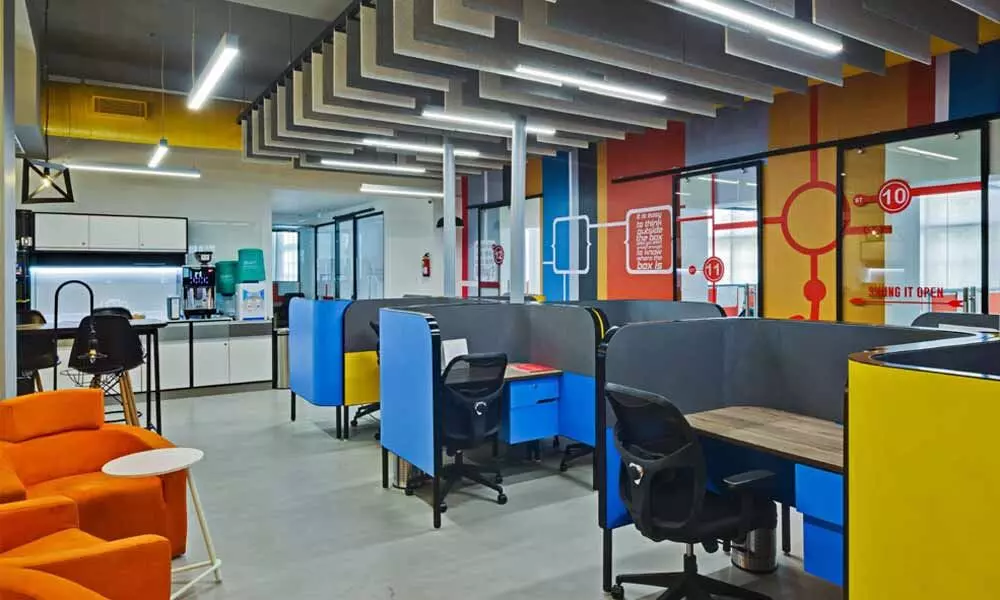Live
- Nizamabad MP Dharmapuri Arvind and Jagtial MLA Dr. Sanjay Kumar Meet CM Revanth Reddy
- Hyderabad CP CV Anand Issues Stern Warning to Bouncers
- MP Laxman Criticizes Police Conduct, Calls for Support for Victims' Families
- Fire Breaks Out in Kachiguda-Chennai Egmore Express, Passengers Evacuated Safely
- CM Revanth Reddy Condemns Attacks on Film Personalities' Homes, Calls for Strict Action
- Victory Venkatesh and Nandamuri Balakrishna to Set Screens on Fire with Unstoppable Season 4
- Over 71.81 crore Ayushman Bharat Health Account numbers generated: Centre
- In special gesture, Kuwait's Prime Minister sees-off PM Modi at airport after conclusion of historic visit
- Veer crowned PGTI Ranking champion, Shaurya wins emerging player honour
- Sr National Badminton: Unseeded Rounak Chauhan, Adarshini Shri reach singles semis
Just In
Hyderabad and Bengaluru lead flexible leasing space


Overall stock of flexible space may cross 40 mn sft in 2020 from 30mn sft in 2019
Hyderabad: India's IT hubs – Hyderabad and Bengaluru- are leading flexible space take-up in the country as the both the cities accounted for half of the total activity, according to a latest study by CBRE South Asia Pvt Ltd, India's leading real estate consulting firm.
The flexible space take-up reached 10.8 million sft in 2019, while flexible space stock touched 30 mn sft in India in 2019 recording a growth of about 60 per cent from 2018. The sector recorded an increased inflow of funds in 2019, with about $140 million of funding provided by angel investors, PE funds and debt funds.
CBRE in the report titled 'India Flexible Space Digest-2019,' said that on the back of technology adoption, increased occupancy rates and growing investments, the year 2019 recorded an all-time flexible leasing activity. Among the key markets, Bangalore and Hyderabad accounted for about half of the flexible space take-up in India followed by Delhi-NCR and Mumbai in 2019.
Elaborating the findings of the CBRE report, Anshuman Magazine, Chairman and CEO (India, South East Asia, Middle East and Africa), CBRE, said: "In today's dynamic and technology driven business environment, corporates are beginning to explore various workplace solutions which could result in capex reduction and increased agility of their RE portfolio in the sector. Given the overall performance of the sector, we expect the demand to remain steady with an overall stock of flexible space anticipated to cross 40 mn sft by the end of 2020." Los Angeles- headquartered CBRE Group is a Fortune-500 and S&P-500 company and is the world's largest commercial real estate services and investment firm.
According to CBRE, the overall stock in flexible space market saw a historic increase of about 60 per cent from about 19 million sft in 2018 to touch 30 million sft in 2019. The flexible space stock was mainly dominated by Bangalore, followed by Delhi-NCR and Mumbai in 2019. The CBRE report also highlighted that the uptake in the flexible space leasing in 2019 was dominated by hybrid spaces and managed space (77 per cent) followed by coworking and business centres (23 per cent).
The CBRE report further highlighted the increased inflow of funds in 2019 as angel investors, PE funds and debt funds provided about $140 million of funding.
Ram Chandnani, Managing Director (Advisory and Transaction Services- India), CBRE South Asia, said: "Going forward, the overall share of office space leasing is expected to increase from about 14 per cent in the 2019 to 16-20 per cent in 2020 and touch about 10-12 mn sft. Besides leasing space in the top three cities, operators are expected to expand in Hyderabad, Pune and Chennai in 2020."
Many operators have been adopting specific apps that provide intergroup social platforms where occupiers can post business requirements. An innovative example of such tech incorporation is of a managed space operator that was planning to introduce robotics across its centers in the coming quarters. In case of managed office spaces, the operators have been leveraging their tech platforms to efficiently design and build spaces as well as manage and monitor the activity of occupants.
OUTLOOK FOR 2020
Although the flexible space may begin to consolidate, occupiers are likely to continue using the segment as an active component of their overall RE strategy, rather than as a reactive solution.
For Occupiers, at the portfolio level, the use of flexible office space, such as that provided by managed and hybrid space operators, is now considered one of the preferred alternative solutions for occupiers.
Corporates are also expected to continue leasing flexible spaces when entering new markets or consolidate operations which typically involves longer lease terms. In addition to an already-evident 'flight to quality,' occupier demand in 2020 is likely to increasingly focus on user experience and agility. As part of this shift, employee engagement is expected to start emerging as a key driver of occupier strategy.
Increased occupancy rate: This was primarily a result of established corporates leasing large-sized spaces in both hybrid and managed spaces. The corporates preferred these spaces as they help reduce capex, provide a locational advantage and increase the agility of their RE portfolios.
For Landlords: As 'space-as-a-service' becomes a reality, CBRE expects landlords to allocate a portion of their real estate portfolio to flexible spaces in both existing and upcoming developments. CBRE expects to see continued development of flexible space in 2020, with landlords becoming more strategic and differentiating their flex offerings to enhance end-user experience.
The model of engagement and partnership between landlords, occupiers and flex operators would continue to evolve in 2020, as landlords create their own flexible space brands or partner with experienced operators.

© 2024 Hyderabad Media House Limited/The Hans India. All rights reserved. Powered by hocalwire.com






